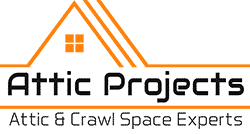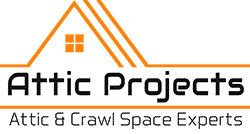Choosing the right insulation for your home is essential to staying comfortable and avoiding rising utility bills. However, it isn’t always obvious which type of insulation is best. Spray foam and injection insulation are two of the most widely used types. Here’s what you need to know about them.
At Attic Projects, we help you make the decision easy with expert advice and professional installation services. Our experienced team can help you select the perfect insulation option that suits your needs, enhances comfort, and maximizes energy efficiency. Contact us today for a free consultation, and let us guide you through every step of upgrading your home’s insulation.
Understanding the Basics of Spray Foam vs. Injection Insulation
Both spray foam and injection insulation are types of foam insulation, but they differ in various ways.
Spray Foam
Spray foam is a robust insulation material made from isocyanate and polyol resin. After spraying, it expands into foam and rises to over thirty times its liquid volume, filling gaps and delivering an airtight seal.
Multiple types of spray foam, including open-cell and closed-cell, are also available, with differing density and insulation properties.
Due to its significant expansion, spray foam insulation is widely used in new construction to fill large voids.
Injection Foam
Injection foam is made from phenolic or urethane-based materials. The key difference between injection foam and spray foam is that injection foam does not expand. Instead, it stays in a highly dense form.
This makes it a good option for dealing with enclosed spaces where expansion can cause issues and retrofitting existing structures. It is less invasive than spray foam, so it is often selected when dealing with older homes.
While injection foam is still an excellent insulator, it doesn’t have the same natural vapor barrier properties as spray foam. Depending on whether your home has had moisture issues, that could be an important detail.
What Attic Projects Recommends For Insulation Installation
Installing Spray Foam Insulation
At Attic Projects Company, we prioritize the health and safety of our clients and the environment while ensuring the best insulation solutions for your home. After careful consideration, we have decided not to use spray foam insulation for several reasons:
- Health and Safety Concerns: Spray foam releases volatile organic compounds (VOCs) and other chemicals during and after installation. These emissions can cause respiratory issues, headaches, and other health risks. Our commitment to your health is why we opt for safer, less volatile materials.
- Professional Application: Spray foam requires precise installation by trained professionals to avoid issues such as uneven coverage or gaps. Mistakes in application can reduce effectiveness and increase costs. We believe in using materials that provide more flexibility and forgiveness during installation.
- Higher Costs: The initial cost of spray foam is significantly higher than that of other insulation types. We aim to provide cost-effective solutions without compromising quality and effectiveness.
- Environmental Impact: Spray foam ingredients are often derived from petroleum, which has a higher environmental footprint. At Attic Projects Company, we prefer using sustainable materials like cellulose made from recycled paper to help protect our planet.
- Permanence and Accessibility: Once installed, spray foam is difficult to remove, complicating future repairs or upgrades to your home’s infrastructure. We choose materials that allow for easier modifications and repairs, enhancing the long-term maintenance of your home.
- Moisture Management: Incorrect spray foam application can trap moisture within your walls, leading to mold growth and potential structural damage. We use insulation solutions that help manage moisture effectively, keeping your home dry and mold-free.
At Attic Projects Company, our choice to avoid spray foam insulation reflects our dedication to your health, safety, cost-efficiency, and environmental responsibility. We’re committed to providing the best insulation solutions tailored to your needs without the drawbacks of spray foam.
Installing Injection Insulation
Attic Projects Company is committed to delivering top-notch insulation solutions that enhance comfort, efficiency, and value in your home. We highly recommend injection foam insulation for several key reasons:
- Superior Energy Efficiency: Injection foam insulation seals walls completely, filling every nook and cranny. This comprehensive coverage dramatically reduces energy leakage, ensuring your home stays warm in the winter and cool in the summer, leading to noticeable savings on your energy bills.
- Non-Invasive Installation: One of the biggest advantages of injection foam is its ease of installation. We can upgrade your home’s insulation without removing wall surfaces. This method involves injecting the foam through small holes, making it ideal for improving insulation without disrupting your living space.
- Enhanced Moisture Resistance: Our injection foam insulation offers excellent moisture resistance, which helps prevent the growth of mold and mildew. This is particularly beneficial in damp climates, ensuring your home remains dry and healthy.
- Superior Soundproofing: The density and expansive nature of injection foam make it extremely effective at reducing noise. Our insulation helps create a quieter and more serene home environment, whether street noise or indoor sounds.
- Improved Indoor Air Quality: Injection foam helps seal pollutants, allergens, and dust from entering your home. This is especially beneficial for individuals with allergies or respiratory issues, as it significantly improves indoor air quality.
- Structural Support: Beyond insulation, injection foam can enhance the structural integrity of your walls. The foam’s adhesive qualities can bind the wall materials together, adding strength and durability.
- Eco-Friendly Options: We are mindful of our environmental impact and offer injection foam insulation products that are environmentally friendly, featuring lower VOC emissions and reduced environmental footprint.
At Attic Projects Company, we recommend injection foam insulation for its effectiveness and efficiency and for its minimal impact on your daily life during installation. It’s an excellent choice for anyone looking to upgrade their home’s insulation with minimal fuss and maximum benefit.
Factors to Consider When Making Your Choice
Choosing the right insulation for your home involves careful consideration of several key factors to ensure you’re satisfied with your decision in the long term. While spray foam is often touted for its insulation efficiency and air-sealing properties, it may not always be the best choice.
Insulation Efficiency
Spray foam insulation does offer a high R-value and excellent gap-filling capabilities, which are great for blocking heat flow. However, the air sealing can be too effective, potentially trapping moisture and leading to mold or structural issues if not perfectly applied. This makes it critical to ensure proper installation, which can be challenging and costly.
Durability and Maintenance
Both spray foam and injection foam are durable and resistant to pests and mold. However, spray foam’s rigidity can become a drawback if the building settles or shifts, potentially leading to cracks in the insulation layer.
Injection foam, on the other hand, tends to maintain its integrity without shifting or settling over time, providing a more reliable and maintenance-free option.
Cost
The initial cost of installing spray foam is typically higher than that of injection foam, largely due to the complex installation process and the need to meticulously cover extensive areas. Injection foam is often more cost-effective for existing structures because it can be applied with minimal disruption and without extensive demolition or renovation.
Getting the Right Insulation for Your Home
Make the right choice by getting expert advice and a reliable quote from the team at Attic Projects. Contact us today for more information!




